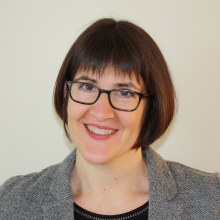November 2018 Spotlight on the SRCD Policy Fellow: Erin Cannon, Ph.D.
Erin Cannon, Ph.D., 2018-2019 Federal Executive Branch Policy Fellow
This past September, I began my second year as an Executive Branch fellow in the Office of Planning, Research, and Evaluation (OPRE) in the Administration for Children and Families (ACF), U.S. Department of Health and Human Services. The work at OPRE changes with the seasons, from the start of the federal government’s fiscal year on October 1, through its conclusion on September 30. It really takes a year to understand the full scope of the job. It has been nice to reflect on the entirety of my first year, to note the challenges, accomplishments, and recognizing that with each day I move forward, there is a new sense of familiarity with the work, and excitement for the many new learning opportunities on the horizon.
This year, I am excited to see the research project I began developing last fall, come to fruition. When I was assigned this project, I was told ACF was interested in understanding the potential for using “human-centered design” to improve child and family outcomes in ACF programs. Simply put, human-centered design is a method for solving complex problems. It begins with understanding the needs of the end-user. In the case of human services, this could mean starting with the families we serve, and working to tailor delivery of services to best meet their needs. I was tasked with becoming the office expert on the topic, and leading the direction of the work. I gathered literature, talked to people in the field and in government, took online courses, and developed research questions that seemed to be unanswered by the literature. I learned to write a statement of work, and with help of my colleagues, created a three-year contract that was awarded to Child Trends in September. Through this contract, we aim to: 1) understand what human-centered design is in the context of human services; 2) assess the state of the field, by learning from programs that have used it; and finally, building on what we have learned, 3) develop a pilot study to help understand the feasibility, implementation, sustainability, and evaluability of humancentered design in ACF programs.
I continue to be grateful to SRCD and my host office for providing rich learning opportunities as well as mentorship opportunities for reflection and growth. I work with incredibly bright, hard working, and supportive colleagues who inspire me every day. It is wonderful to be surrounded by people who are equally as committed to improving opportunities for low-income children and families.
